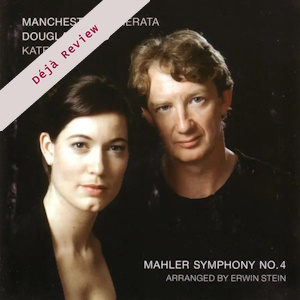
Déjà Review: this review was first published in June 2005 and the recording is still available.
Gustav Mahler (1860-1911)
Symphony No. 4 in G (1899/1900, arr. Erwin Stein, 1920; reconstructed Alexander Platt 1990)
Kate Royal (soprano)
Manchester Camerata/Douglas Boyd
rec. live, 6 November 2004, Royal Northern College of Music, Manchester
Avie AV2069 [56]
Arnold Schoenberg’s concerts at his Society for Private Musical Performances have gone down in the annals of history for their ground-breaking programmes. Amongst the many new works was this arrangement of Mahler’s Fourth Symphony by a Schoenberg pupil, Erwin Stein. It is heard here in a reconstruction by Alexander Platt. The original instrumental parts have disappeared, so Platt used Stein’s annotated full score.
It is a remarkable exercise, rather like hearing a vivid dream of Mahler 4 through the prism of Schoenberg’s First Chamber Symphony. Of course there is the added transparency; almost guaranteed, you will hear figuration you will have missed in the full version. The added emphasis on voice-leading means that one can appreciate Mahler’s expert skills anew.
There is frequent delicacy to the textures, a facet emphasised by the Mancunians’ unfailingly musical response to the arrangement. The surfacing of a piano from time to time may come as a surprise. It is used most effectively to underline pizzicati, as most obviously in the second movement. Reallocation of solos may raise the occasional eyebrow; the horn solo at around 5’35 is taken over by clarinet, for example.
Obviously crescendi will have less of an effect, but this actually highlights a rather fairy-tale atmosphere. But being Mahler this fairy-tale has an adult undercurrent; there are ominous shadows underlying this Wunderhorn innocence.
The slow movement almost certainly poses the greatest challenges for a chamber group. Sustaining the intensity over such a period (20’48) is no easy task. To his credit, Douglas Boyd does not compromise on tempo – it is daringly slow initially. As a result the movement still carries the emotional weight of the symphony. Some of the scoring emerges as quite modern and forward-looking, and there is a surprising heft to the main climax (around 11’50).
The famous vocal finale emerges beautifully and naturally out of this slow movement. Soprano Kate Royal has an innocence all of her womanish own. The slower segments of this movement are positively luminous here; interesting that some of the chordal sequences sound like a harmonium. The line ‘Kein Musik ist ja nicht auf Erden’ towards the close is lovely here, if not as spiritually uplifting as it can be.
Recommended. The recording is superb and it is difficult to believe this is a live performance, given the overall excellence of instrumental response. More than a curio, this Fourth has an appeal and an impact all of its own.
Colin Clarke
Buying this recording via a link below generates revenue for MWI, which helps the site remain free



















